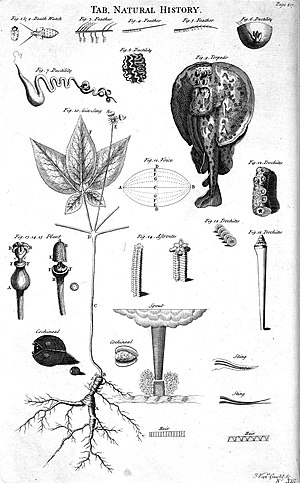
Back Natuurgeskiedenis AF تاريخ طبيعي Arabic تاريخ طبيعى ARZ Historia natural AST Təbiətşünaslıq AZ Естествознание Bulgarian প্রাকৃতিক ইতিহাস Bengali/Bangla Història natural Catalan مێژووی سروشتی CKB Přírodopis Czech

Natural history is a domain of inquiry involving organisms, including animals, fungi, and plants, in their natural environment, leaning more towards observational than experimental methods of study. A person who studies natural history is called a naturalist or natural historian.
Natural history encompasses scientific research but is not limited to it.[1] It involves the systematic study of any category of natural objects or organisms,[2] so while it dates from studies in the ancient Greco-Roman world and the mediaeval Arabic world, through to European Renaissance naturalists working in near isolation, today's natural history is a cross-discipline umbrella of many specialty sciences; e.g., geobiology has a strong multidisciplinary nature.
- ^ With "natural history" articles more often published today in science magazines than in academic journals.Natural History WordNet Search, princeton.edu Archived 2012-03-03 at the Wayback Machine.
- ^ Brown, Lesley (1993), The New shorter Oxford English dictionary on historical principles, Oxford [Eng.]: Clarendon, ISBN 0-19-861271-0